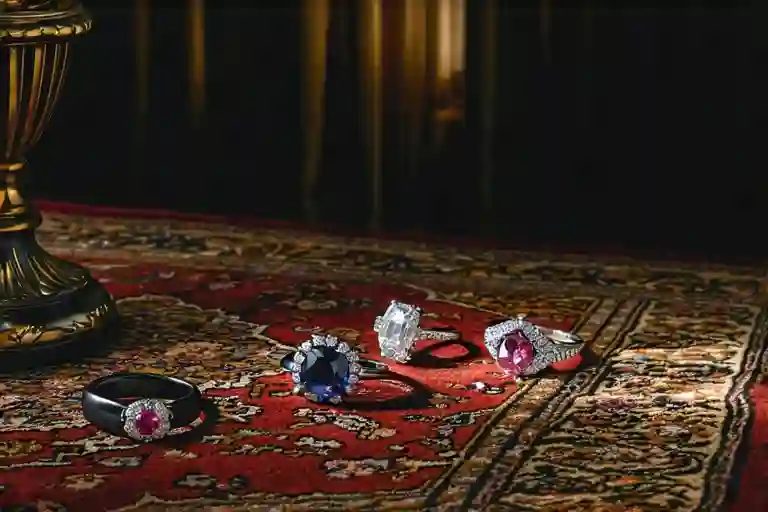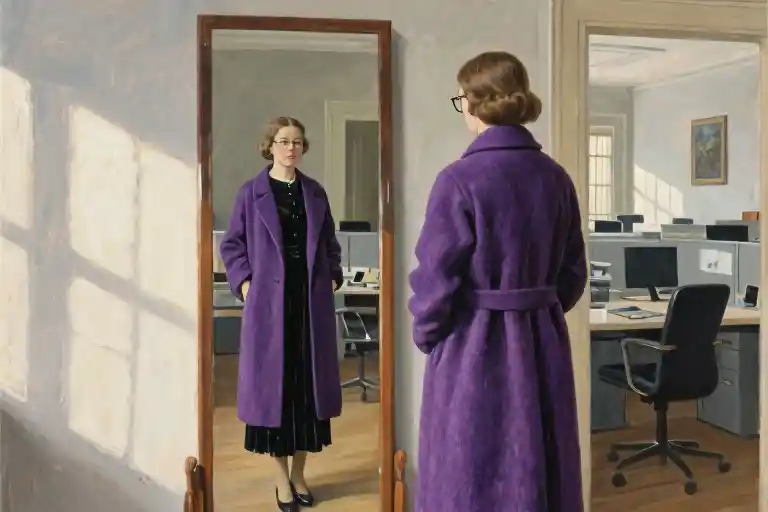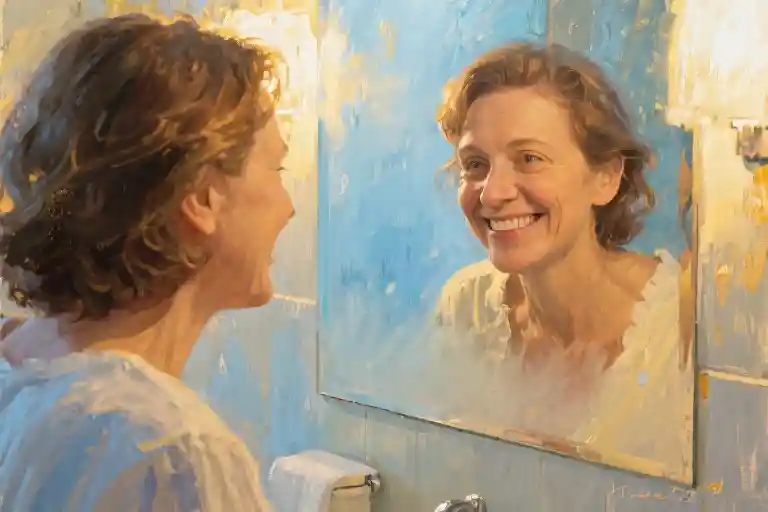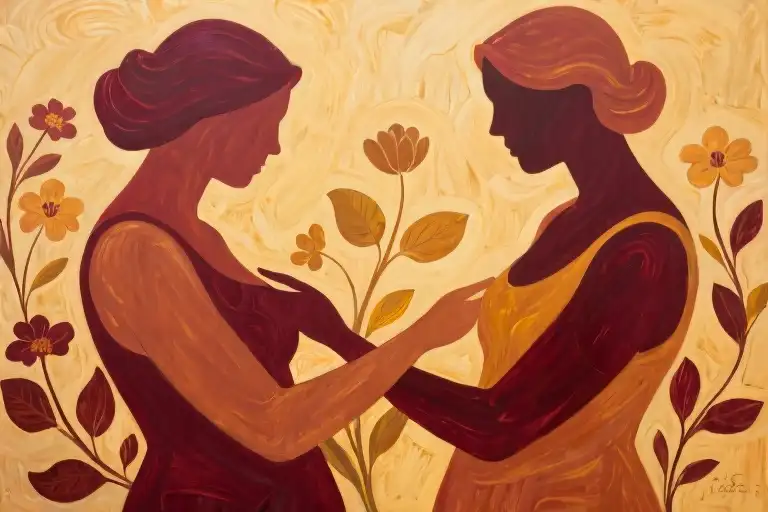December 24th, 1917 – 3:15PM. The gas lamps in our flat struggled against the woolen grayness pressing at the windows, their halos of light dissolving into the fog like yolk into batter. Alice sat across from me, her cigarette dangling between two fingers as she sorted rings with the methodical precision of a pharmacist counting pills. Each gemstone clicked against the mahogany table—rubies to the left, sapphires forming a haphazard circle, the occasional black onyx set apart like a mourner at a wedding.
Her exhales of smoke curled around the chandelier above us, the crystals trembling whenever Louisa’s boot heels connected with the lower cabinet. Three kicks per minute, always in the same spot where Richard’s army boots had left scuff marks last Christmas. The rhythm felt like Morse code, though I’d never bothered to decipher what message might be trapped in that dented wood.
Alice paused with an emerald ring suspended mid-air, her thumbnail tracing the Art Nouveau vines engraved on its band. Through the grimy windowpane behind her, I could just make out the silhouette of St. Pancras clock tower, its hands frozen at 2:50 since the Zeppelin raids began. The discrepancy between its stilled time and our mantel clock’s persistent ticking made my teeth ache.
A cylinder of ash dropped from her cigarette onto a ruby cluster ring. She didn’t brush it away. The way the gray powder settled into the prong setting reminded me of how snow had clung to Laura’s eyelashes yesterday when she’d returned from the hospital—how it had taken fifteen minutes to melt, as if her body had forgotten how to generate warmth. I opened my mouth to mention this when the front door slammed open downstairs, releasing a burst of voices that scrambled up the staircase like squirrels. The twins were home early.
Louisa’s book snapped shut. Her heels stilled against the cabinet for the first time since breakfast. Alice set down the emerald ring very carefully, aligning it with others of its kind, and I noticed her little finger trembling—the one that should have worn her mother’s pearl ring, had the pawnshop not needed visiting in September. The clock ticked. The gaslights flickered. Somewhere below us, woolen mittens hit the floor with a damp thud.
The Grey Ritual
The rings clinked like distant artillery fire as Alice sorted them. Emerald, ruby, sapphire—each stone found its designated pile with mechanical precision. A thin column of ash grew from her neglected cigarette, trembling before finally collapsing onto a garnet’s faceted surface. The clock above the mantelpiece marked each passing second with a throaty tick, out of sync with the irregular percussion of metal against wood.
Through the grimy windowpane, London’s winter light diffused into the room like weak tea. It caught the edges of Alice’s profile—the sharp cheekbones, the downward tilt of her lips—but left her eyes in shadow. Her fingers moved with the practiced efficiency of someone who’d performed this ritual through three Christmases of war. First the rubies (always starting with rubies), then the sapphires, then those damnable black onyx pieces that left charcoal smudges on her fingertips.
Louisa’s heels connected with the lower cabinet in a staccato pattern—three quick raps, a pause, then two heavier blows. The rhythm vaguely matched the chorus of ‘It’s a Long Way to Tipperary’ that the pub singers had mangled last evening. Her nursing manual lay open across her knees, its pages pristine compared to the scuffed leather of her boots. Those same boots had left their marks along the cabinet’s base during similar afternoons in ’15 and ’16—dark crescents that no amount of polish could erase.
The cigarette burned down to the gold foil band before Alice noticed. She exhaled through her nose, watching the smoke curl around a particularly large ruby ring. Its stone held the deep red of arterial blood, the kind that pooled beneath men lying in French mud. The clock struck the quarter hour just as the front door burst open, bringing with it the scent of snow and something sharper—perhaps the antiseptic clinging to Laura’s sleeves, or the metallic tang of Madeline’s factory overalls.
‘You’ll never guess what Dr. Hargreaves told us at the—’ Laura’s voice cut off abruptly as her scarf caught on the hatstand. Madeline said nothing, methodically peeling off woolen mittens that had gone stiff with melted snow. One black onyx ring, forgotten on the table’s edge, began to roll toward the newspaper fragment they’d brought in—a torn corner bearing half-printed letters that might have spelled ‘casualties’ or perhaps ‘Christmas’.
Alice caught the ring mid-descent. Her thumb rubbed across the stone’s polished surface, leaving no trace of the ash that had settled into its brethren’s crevices. Outside, the grey deepened toward evening, swallowing the outlines of a recruitment poster still clinging to the opposite building. The bold ‘1916’ at its bottom curled upward, as if trying to escape its own outdated urgency.
The Restless Background
The rhythm was unmistakable – three firm kicks against the oak cabinet, followed by two softer ones, then a pause just long enough to draw breath before repeating. Louisa’s heels had worn the varnish thin in that particular spot, leaving behind the ghostly outline of a military boot’s tread. Her nursing manual lay open across her knees, its pages crisp with disuse despite the urgent red stamp on the cover: ‘First Aid Procedures – 1917 Revised Edition’.
Between the kicks, I could hear the faint crinkle of paper as she turned pages without reading. The gaslight caught the brass buckle of her left shoe each time it swung forward, flashing like a heliograph signal. On the shelf above her head, someone had placed a cardboard box labeled ‘Respirators’ in careful schoolteacher’s script, its corners softened by months of being moved from table to cupboard and back again.
Louisa’s kicks synchronized with the dripping of the kitchen tap behind me – not perfectly, but close enough that the discordance itched at my temples. The patterns changed when she was anxious: five rapid taps, silence, then three deliberate thumps that shook the teacups on their hooks. Today’s sequence suggested a middling agitation, the sort brought on by waiting rather than remembering.
Her right heel caught a splinter on the seventh cycle, making her jerk the book upward in reflex. The movement dislodged a photograph tucked between the pages – a group portrait of women in aprons standing before a tent flap, their smiles not quite reaching their eyes. It fluttered to rest against the respirator box, coming to rest with one corner dipped into the shadow of the container like a tongue testing uncertain waters.
The kicks resumed, softer now. Through the window behind her, the gray light shifted imperceptibly as clouds moved over the city. Somewhere beyond our walls, Christmas Eve continued its uneven march through wartime London, carrying with it all the muffled noises of a city trying to remember how to celebrate.
Snow and Messages
The front door banged open with the particular violence only those two could manage. A gust of cold air rushed in first, carrying snowflakes that dissolved instantly on the worn Persian rug. Then came the voices – Laura’s high-pitched chatter overlapping with Madeline’s quieter interjections, their words tumbling out in that synchronized way twins have even when they’re arguing.
Laura was halfway through unwinding her scarf before she’d fully crossed the threshold, the wool trailing behind her like a banner. ‘You’ll never guess who we saw at the chemist’s,’ she announced to the room at large, though her eyes darted immediately to Alice’s ring-strewn table. Her cheeks were flushed from the cold, or perhaps from whatever gossip she was about to impart.
Madeline entered with more deliberation, pausing to stomp snow from her boots in the precise rhythm Louisa had been kicking the cabinet. Her mittens – those damned woolen things Alice had knitted last winter – made her fingers clumsy as she worked at her coat buttons. One by one she counted them free, her lips moving silently. Four pewter buttons, each slightly dented from when she’d fallen on the ice last week.
Their arrival sent a flurry of activity through the flat. Laura’s discarded scarf landed on the armchair, then slid to the floor as she leaned over Alice’s shoulder. ‘Are those Mrs. Weatherby’s?’ she asked, reaching for a garnet ring. Alice intercepted her hand without looking up, blowing cigarette smoke away from the jewelry.
Madeline, meanwhile, had progressed to removing her gloves. She peeled them off finger by finger, laying them flat on the kitchen table where they left expanding dark patches on the wood. The water traced the grain like tiny rivers finding their course. From where I sat, the shape they formed looked almost like the front lines we’d seen in last week’s newspaper.
That paper now lay in pieces on the floor by Laura’s feet. She’d brought in a fresh edition, already torn at the edges from being stuffed in her coat pocket. A fragment near my shoe showed half a headline: ‘-RISTMAS TR-‘ above what might have been ‘truce’ or perhaps ‘trust’. The rest was lost under Madeline’s wet glove.
Louisa finally slid off the counter, her book forgotten. ‘Well?’ she demanded. ‘Who did you see?’ The question hung in the air along with Alice’s smoke, while outside, the grey afternoon deepened toward evening.
The Weight of a Black Onyx
The black onyx ring rolls with unnatural precision across the uneven tabletop, its trajectory unimpeded by cigarette burns or warped wood. It comes to rest directly atop the fragmented newspaper headline – the one Madeline had brought in clinging to her damp glove – where the words ‘Christmas Truce’ blur beneath the stone’s opaque surface. Alice’s fingers hover mid-air, frozen in the act of sorting. For the first time this afternoon, her system falters.
Outside, the recruitment poster’s faded ink bleeds into the snow. A relic from last winter’s recruitment drive, its corners flap against the brickwork like the wings of a grounded pigeon. The date – December 1916 – stands in stark relief against the newer snow. Time moves differently now. We measure it in ration coupons and air raid drills rather than seasons.
From the piano in Mrs. Henderson’s flat below comes a stumbling rendition of ‘Silent Night.’ The missed notes cluster in the second verse, where the left hand should play A minor but keeps finding B flat. Someone’s forgotten, or perhaps they never learned. The dissonance lingers in the space between Laura’s breathless account of the field hospital and Louisa’s methodical kicks against the cupboard door. Three sharp impacts, then silence. Always three.
Madeline peels off her remaining mitten. Five tin buttons click against the桌面 – one missing from her coat’s left sleeve. She arranges them in a line beside the newspaper fragments, military-straight. The factory stamp on each bears the crown emblem they stopped using in August. Inventory of the missing, in miniature.
The onyx ring catches what little light penetrates the grey. It belonged to Alice’s brother, this much I know. The others have their designated categories – rubies for letters never sent, sapphires for promises broken before deployment – but the black stones defy her system. They accumulate in the tray’s corner like shrapnel fragments waiting to be cataloged.
Laura’s scarf finally comes undone in one sudden motion, releasing the scent of carbolic and snow. ‘They’re saying the Germans—’ she begins, but the piano downstairs chooses that moment to strike two discordant keys at once. The sound swallows her words whole. Alice’s hand closes around the onyx. Somewhere beyond the glass, a poster proclaiming ‘Women of Britain Say GO!’ detaches completely and vanishes into the white.




